Creatine is a very useful sports supplement to take if you’re looking to start weight lifting, increasing your general muscle mass, or doing high-intensity workouts as it provides more energy for your muscle cells, enabling them to work harder for longer.
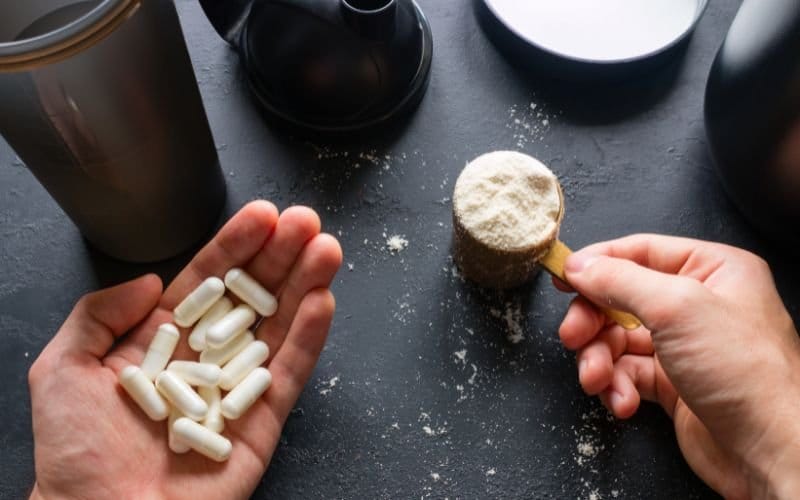
Creatine is naturally produced by the body but for physical tasks requiring greater muscular power or endurance than usual, supplementation can help. With any health or fitness supplement, creatine comes with its own set of side effects and risks, which you’ll need to decide are worth it or not to you.
Hair loss is a common concern for people looking into starting creatine supplements, so keep reading to find out what you need to know!
At the most fundamental level, the answer to this question is no. Creatine itself does not cause hair loss. However, if you’ve experienced hair loss or thinning after a few weeks of creatine supplementation, or if you’re nervous about starting to take creatine for this very reason, then your fears do have a basis.
Although creatine is not directly responsible for causing hair loss, it does promote accelerated DHT production which can lead to hair loss.
DHT stands for dihydrotestosterone, which is an androgen (or sex hormone) that contributes to the development of typically “male” physical characteristics such as increased body and facial hair, deeper voice, and other such qualities.
DHT is significantly more powerful than testosterone and therefore, the side effects of an undue increase can yield some undesirable outcomes, one of which, unfortunately, is hair loss.
Although DHT is responsible for increased hair growth (eg men typically having more body and facial hair than women), it also causes hair to fall out more quickly and easily.
Your hair grows in a cycle. Hair follicles experience periods of growth, then something of a resting or maintenance period where not much happens, and then they move into the hair loss stage where strands begin to fall out.
This cycle is repeated throughout your lifetime (or at least for as long as you have hair!) and things like changes in hormone levels can impact the different stages.
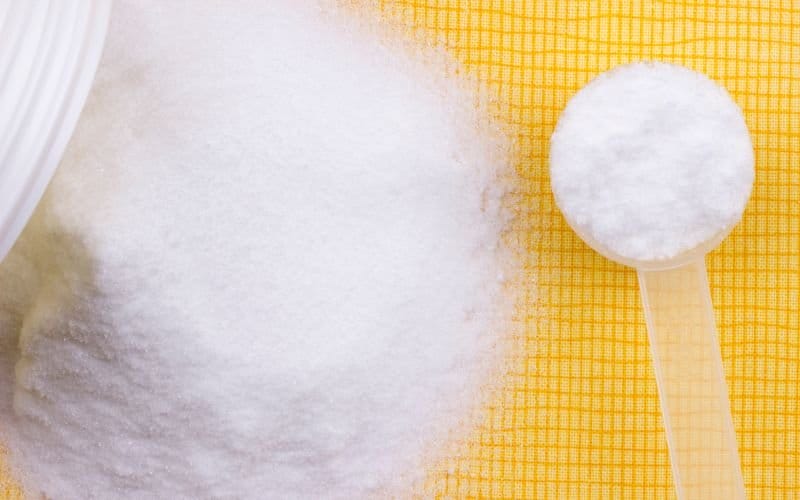
In the case of DHT, it is the hormone responsible for promoting hair growth so in that sense, is very necessary. However, in excess, DHT can accelerate hair growth to the point where the new hairs are thinner and weaker, as though they have not been given sufficient time to develop properly.
This makes the new hairs more prone to breakage as well as premature thinning.
Because the hairs begin falling out too quickly or too early, the balance between hair growth and loss is upset, and hair loss starts to occur more quickly than the growth period can replace the hair (in other words, you start losing more hair than you’re growing), leading to thinning and baldness.
DHT is created through an enzyme reaction as a by-product of testosterone. Because women naturally have just a fraction of the testosterone men have, the production of DHT in women is subsequently much lower.
As a rule, this means that women experience hair thinning and loss as a direct result of DHT over-production much less commonly than men do, however, it can still happen.
Women may experience more hair loss during times of hormonal change such as during menstruation, pregnancy, or menopause as the thyroid produces different levels of different hormones than usual.
All that said, women are significantly less affected by hair loss and hair follicle damage as a result of high levels of DHT than men, but they are still susceptible to an increase if taking high doses of creatine.
If you are taking creatine supplements and are beginning to experience hair loss as a result of increased DHT production, there are some measures you can take to minimise this loss and counteract the effects of DHT.
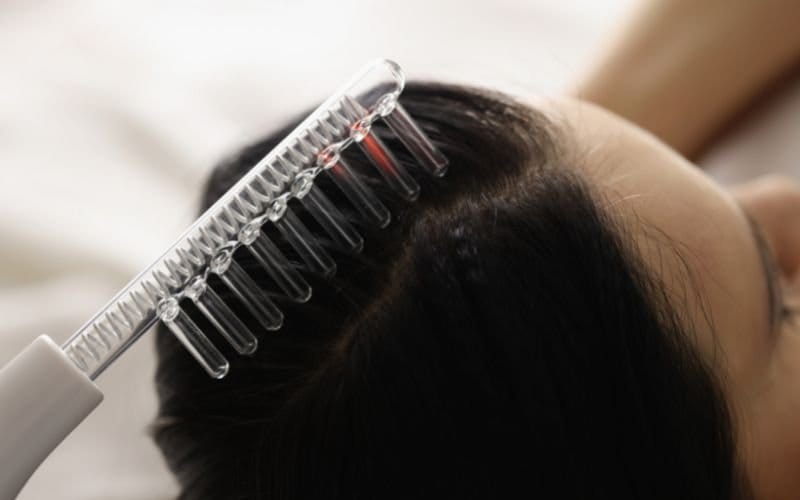
There have been numerous studies into so-called “DHT blockers” and certain ingredients have been found to be quite successful in slowing the production of DHT and subsequently slowing its negative effects. The most successful DHT blocker available at the moment is called finasteride which essentially halts DHT production to put a stop to hair loss.
Finasteride can be prescribed in tablet form and has been proven to be effective in treating hair loss and receding hair lines. People who are genetically predisposed to hair thinning conditions such as androgenic alopecia (male pattern baldness) can also benefit from taking finasteride.
There are many foods and natural ingredients that can be used to fight hair loss. This is by no means an exhaustive list but should give you and idea of what sort of things you can look into.
Green tea is a popular drink all over the world and apart from being healthy in many ways, it also contains a compound called epigallocatechin gallate (EGCG) which current evidence shows is successful in protecting hair follicles from damage and weakening, allowing your hair growth to be stronger and more even.
Fruits and vegetables rich in quercetin such as onions, kale, apples, and berries have also been shown to block DHT, however studies have primarily been carried out on animals such as rats and human trials have not yet been undertaken.
Similarly, curcuminoids (most widely recognised as being highly-concentrated active compounds in turmeric) have been shown to minimise DHT production by inhibiting the action of the alpha-5 reductase enzyme. Again, human trials are still pending, but the preclinical studies are promising.
Human trials looking at the efficacy of isoflavones in the treatment of hair loss have been very successful, showing that ingesting foods such as edamame and other soy products and supplements decreases DHT production significantly enough to resolve hair loss issues and protect hair follicles.
Regardless of whether you’re currently experiencing hair loss or not, looking after your hair from the get-go is a sure fire way to ensure it remains as healthy, luscious, and strong as possible. treating your hair properly may also help you to minimise hair loss if you are experiencing some after taking creatine for some time.
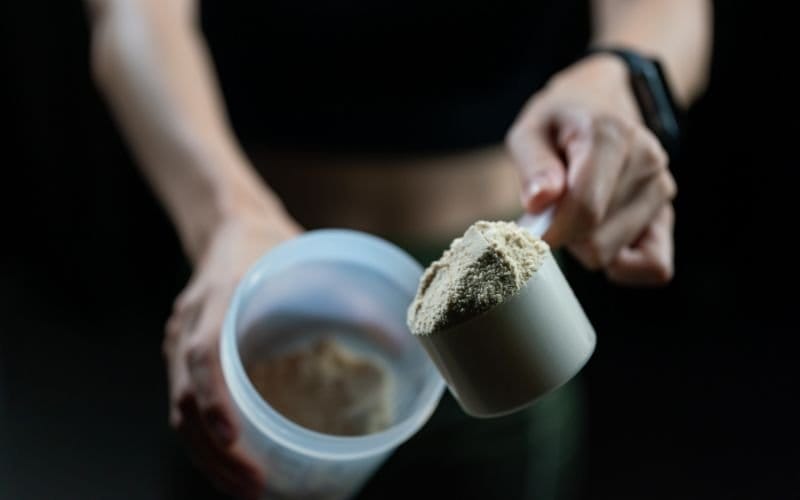
It doesn’t matter if you have long or short hair, brushing or combing is an essential part of keeping your hair and scalp happy. Brushing helps to loosen and shift dead skin cells that may accumulate to cause dandruff, and will also help to distribute your hair’s natural oils more evenly.
Brushing also minimises tangles which can lead to breakage and hairs being pulled out prematurely.
There are supplements you can take which directly impact the health of your hair, and some of the most common include biotin, iron, collagen, and vitamins B through E. as an added bonus, these supplements should also improve the health of your skin and nails so it’s a win-win!
Many people are under the impression that in order for your hair to be healthy, it needs to be washed daily. This is incorrect and can actually lead to the stripping away of essential moisture and oil in your scalp, leading to dry skin and brittle hair.
Depending on your hair type, you should really only need to wash your hair a couple of times per week (or less often) and it’s even possible to “train” your hair to require less frequent cleaning.
Although looking after your hair using these methods won’t necessarily stop you suffering DHT-related hair loss, it will help you to have a generally healthier head of hair.
Hair loss is not the only potential side effect that you might experience as a result (albeit indirectly) of taking creating supplements. Although creatine is a naturally occurring compound in the human body, taking too much of it or taking it and not exercising enough to process it properly can lead to other issues.
Water retention is a common thing to look out for where creatine is concerned. Whether you’re a rugby player, weight lifter, or simply a dedicated gym-bunny, creatine supplementation must be undertaken with a certain level of caution.
If you don’t work out hard enough or use your muscles appropriately, water that has been redirected to your muscle cells by the creatine may be retained rather than utilised, resulting in saggy or flaccid muscles.
Creatine usage can also lead to weight gain, which is something that people are initially very wary of. While it is true that weight gain might happen while you’re using creatine supplements, what a lot of people don’t realise is that this is not down to an increase in fat, but rather in muscle mass.
In other words, if you’re going to start taking creatine, expect to put on weight but understand that it’s only because your muscles are holding more water.
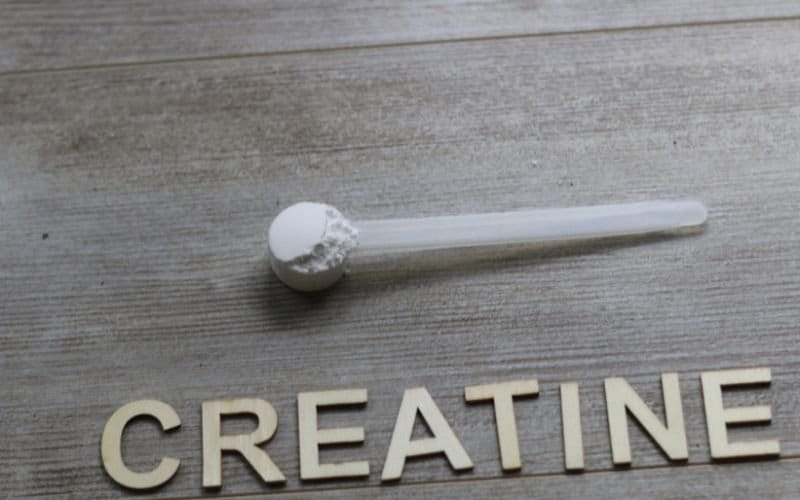
Although there is some contention about whether creatine is directly harmful for those with diabetes or hypoglycaemia, studies suggest that in high doses, creatine may lower blood glucose levels which could pose a risk to people with these conditions.
People with low blood pressure and heart issues should also exercise caution when considering creatine supplements.
Creatine does not directly cause hair loss, but it does lead to an increase in DHT which is directly responsible for hair loss and thinning. Does this mean you should avoid taking creatine? That depends very much on your fitness and strength goals as well as other risk factors as seen above.
DHT-related hair loss is not an automatic deal breaker and there are methods for minimising DHT’s effects, however it is important to keep in mind that you can expect some of your hair to fall out with sustained creatine intake.